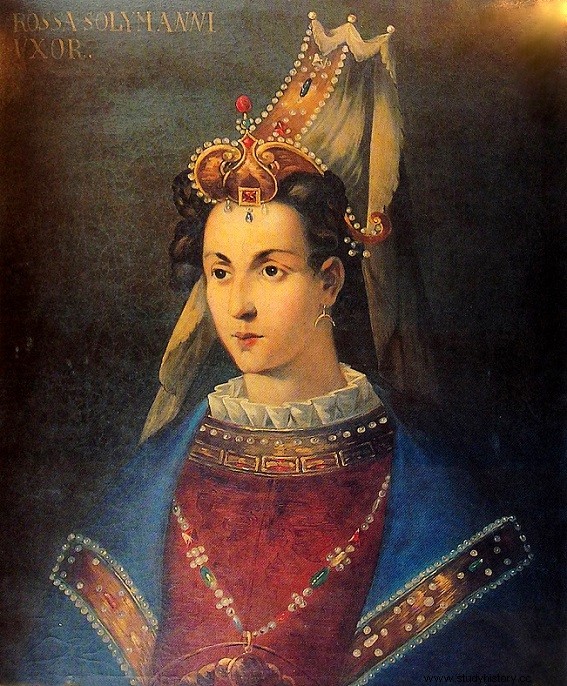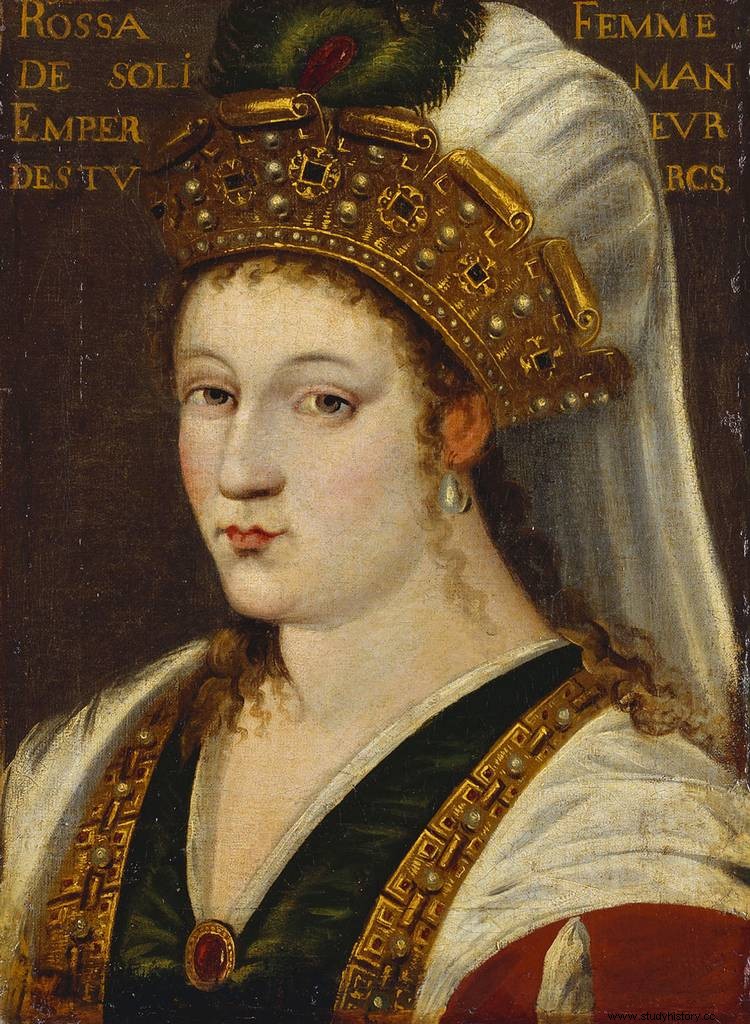A slave who became the wife and advisor of Sultan Suleiman the Magnificent, Sultana Hürrem or Roxelane (circa 1504 – 1558) is one of the most influential women in the history of the Ottoman Empire.
Enslaved
 Originally from Ruthenia, Roxelane ("the Ruthenian") was born around 1504 in Rohatyn, then located within the kingdom of Poland and in present-day Ukraine, under the name of Alexandra Lisovska. Captured during a Tatar raid when she was a teenager, she was taken as a slave to the Ottoman Empire, to Constantinople.
Originally from Ruthenia, Roxelane ("the Ruthenian") was born around 1504 in Rohatyn, then located within the kingdom of Poland and in present-day Ukraine, under the name of Alexandra Lisovska. Captured during a Tatar raid when she was a teenager, she was taken as a slave to the Ottoman Empire, to Constantinople.
Roxelane entered Sultan Suleiman's harem around his accession to the throne in September 1520, probably as a present. She was only around fifteen years old. Her mischievous and playful character earned her the nickname "Hürrem" (the happy one). His first son, Mehmed, was born in 1521, quickly followed by five other children, which gave him a great advantage over his rival Mahidevran, mother of Suleiman's eldest son.
“My black-haired love”
Roxelane quickly becomes the sultan's favourite, and Soliman's favors earn her jealousy within the harem. Abandoning his other concubines, including Mahidevran, the sovereign began an exclusive relationship with the young woman. Very much in love with the young woman, he dedicated fiery verses to her:
My love with black hair and beautiful eyebrows, languorous and treacherous eyes…
I will always sing your praises
I, lover with a tormented heart, Muhibbi with eyes full of tears, am happy
In 1534, Roxelane was freed. Western sources report that, freed and converted to Islam, she would then have refused Suleiman by arguing that a free woman should not have relations with a man outside of marriage; she would have thus obtained that the sultan marries her. Be that as it may, Soliman married Roxelane in 1534, thereby breaking centuries of tradition; the sultans were indeed not supposed to marry their concubines. And a former slave had never been raised to the rank of wife of the sultan.
Sultana Haseki
 Roxelane also obtains the title of Haseki, sultana consort, which earns her a substantial salary. First to bear this title, and opens the way to a long line of sultanas. Alongside her husband, she plays the role of adviser and intervenes in state affairs, particularly in foreign policy, as evidenced by the letters exchanged with foreign sovereigns. Roxelane's influence is such that she is considered one of the most powerful women in the history of the Ottoman Empire.
Roxelane also obtains the title of Haseki, sultana consort, which earns her a substantial salary. First to bear this title, and opens the way to a long line of sultanas. Alongside her husband, she plays the role of adviser and intervenes in state affairs, particularly in foreign policy, as evidenced by the letters exchanged with foreign sovereigns. Roxelane's influence is such that she is considered one of the most powerful women in the history of the Ottoman Empire.
Along with its implications in politics, Roxelane embarked on a vast policy of construction of public buildings, from Mecca to Jerusalem. She thus built mosques, Koranic schools, a hospital for women near the slave market, and baths. It also establishes public soup kitchens, to provide meals to those in need in Jerusalem and Mecca.
Roxelane is suspected of having played a part in succession intrigues, in particular of having undermined the influence of Soliman's eldest son, born to Mahidevran. In the Ottoman Empire, it was customary that when a sultan acceded to the throne, his brothers were killed to avoid any risk of revolt. Roxelane would thus have sought to protect her sons, favoring her third son Selim for his gentle nature.
Roxelane died in April 1558. She is buried in a mausoleum adjacent to that of Suleiman, in the Süleymaniye mosque.
Novels dedicated to him
- Pavlo Zahrebelnyï:Roxelane , 1980.
- Isaure de Saint Pierre:The Magnificent , Albin Michel, 2002
- Vintila Corbul and Mircea Burada, Roxelane and Soliman , Olivier Orban, 1987
- Colin Falconer:Topkapi Nights, 1999, Pocket
